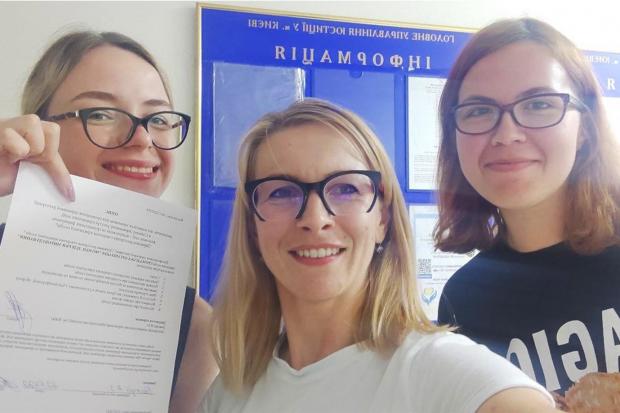Young women speaking out for peace in Ukraine
At twenty-one, Anna Popsui, an activist and master’s student at the Kyiv Institute for International Relations, combines her work and studies with leading a non-governmental organisation, the Young Peacebuilding Leaders (YPL) network. Despite the fear and uncertainty caused by Russia’s ongoing war against Ukraine, Anna has found the strength and courage to make every effort to support young women in Ukraine.
Fleeing the war to join the “merezhinkas”
On February 24 2022, Anna woke up in Kyiv to a friend’s call. “We hadn’t been in touch for over six months, so I instantly thought something had happened. Why else would he be calling me at five in the morning,” she recalls. “He told me that the war had begun.”
Anna and her mother headed to a gas station, but instead of fuel, they encountered a mile-long queue with no gas to be had.
“We considered staying in Kyiv. That evening, a column of tanks was moving along the Chernihiv (a city in northern Ukraine – Ed.) roadway. That rumble still haunts me.”
Anna’s family decided to leave Kyiv the next day despite the lack of fuel.
And, eventually, Anna found herself in a village in the Cherkasy region where she would spend the next several months. It was there that she came across a Facebook ad where the Young Peacebuilding Leaders (YPL) network (The network was established within the project “Strengthening the Capacities of Young Women from Target Communities of the Donetsk and Luhansk Regions to Advance the Women, Peace and Security Agenda at the Local Level” – auth.) was inviting new members to join.
“Around April, I became tired of sitting idly. I realised I needed to get rid of constant thoughts of the horrors of war. The post said, ‘if you support gender equality and share the feminist outlook, join us.’ I applied and hoped for the best.”
Two weeks later, she was invited to join a YPL chat and became one of the “merezhinkas” – as the project’s members call themselves – a word that combines the Ukrainian terms “merezha”, a network, and “zhinka”, a woman.
“At that time, the network had existed for several years, sponsored by many international donors like UN Women, Internews Ukraine, and others. The project has become a true escape from a grim reality for me. I have found like-minded women there,” Anna says.
Finding the strength to advance women’s voices
Shortly after Anna joined the Young Peacebuilding Leaders’ team, a decision was made to institutionalise the project by creating an NGO. Together with two other “merezhinkas”, Anna accepted the proposal to lead it and promote matters of peacebuilding and the involvement of women in decision-making processes.
On its Facebook page, the network speaks about the concerns of young women affected by the war in Ukraine. Mental health is a big concern, and Anna, like many others, has her own ways of coping - her “rules of strength.” She claims it is essential for her to manage her energy consciously and not to exhaust her “built-in battery”.
“I believe it is critical to avoid forcing myself to do what I can’t do immediately and take opportunities to rest, both emotionally and physically. You have to keep track of your well-being, not delay doctor’s appointments, and just be yourself.
A young NGO with an ambitious agenda
Today, the Young Peacebuilding Leaders network continues to actively promote the Women, Peace and Security Agenda among youth. Despite the war, they have already organized regular marathons, ZOOM-conferences, and international training programmes.
“I am particularly proud of three issues. First, our participation in the revision of the UN Security Council Resolution 1325 National Action Plan, for the Luhansk region. Second, my colleagues and I addressed the UN Conference on Localisation of the 2250 Action Plan on Youth, Peace and Security. Finally, last October one of the YPL co-founders was selected for training on conflict mediation held by Clingendael Institute in the Hague. Why is it so crucial? Since we are a pretty young team in terms of participants’ average age - to have your voice heard when discussing national plans and colleagues invited to one of the prominent educational centers in Europe is marvellous, especially considering this happens amidst the ongoing hostilities,” Anna says.
At times, when meeting leaders of existing women’s organizations in person, Anna hears the echo of her impostor syndrome. “When that happens, I may feel like I am not as skilful and knowledgeable as they are. Yet, at the same time, I see how these women support the young generation like myself so we can take over someday and become agents of change.”
Anna wants to see the Young Peacebuilding Leaders network expand across Ukraine and become the voice of young women in the country. The organisation’s next step is to create a psychological support group for young people. This service will include therapists and psychologists helping members address mental health issues, heal from a post-traumatic stress disorder and maintain long-distance relationships.
“We may not have much experience, yet young people’s ideas are the breaths of fresh air. We want our voices to be heard,” she concludes.
This story is part of a series, prepared by the OSCE’s WIN for Women and Men. This is a project aimed at strengthening comprehensive security through innovating and networking for gender equality to showcase women leadership responding to the humanitarian crisis caused by the war in Ukraine. Women leaders are the inspiration and the reason behind the WIN Project, which strengthens OSCE-supported networks and gives rise to new networks, fostering women’s participation and leadership, as well as broadening men’s engagement in achieving gender equality.



